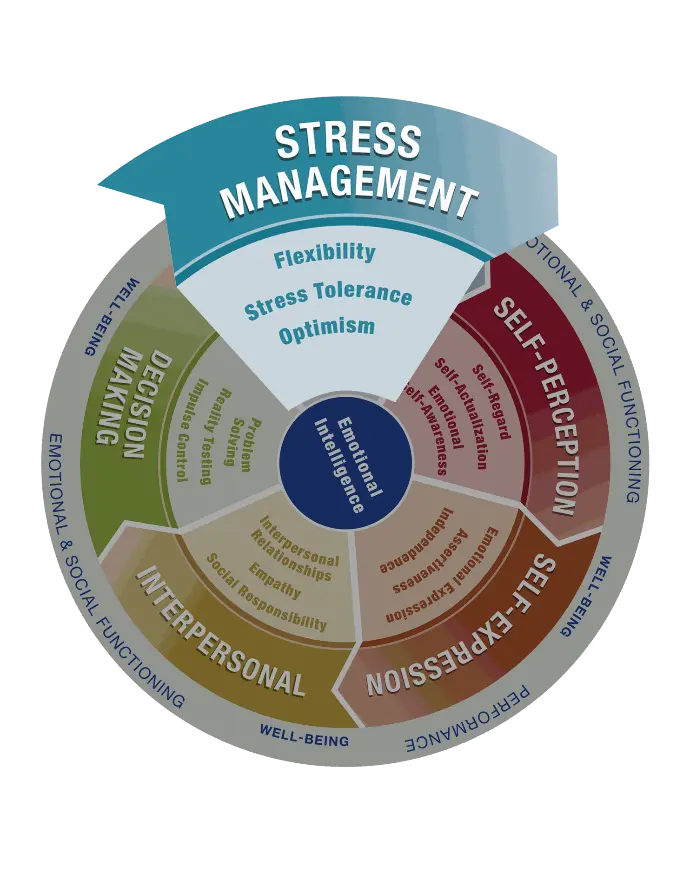Find the courage you need to lead and push back on stress
Being able to manage stress effectively is a critical skill for your leadership.
But stress management isn’t just for relating to yourself and others. It’s also essential for operating within systems of oppression and systems that dehumanize us.
You know the ones I’m talking about.
I mean:
- Capitalism that makes us work tirelessly to achieve our next goal
- Cisheteropatriarchal white supremacist leadership norms that tell us what we should be
- The political environment that’s trying to erase our personhood
As we move through the world and push back on those systems, there’s stress that comes with simply existing. So we need these stress management skills. They’re not only to guide the way we lead. They also help us take care of ourselves to survive and keep going.
Now I know I just said how critical these skills are. But I also want you to notice when you might be overdoing them (yes, that’s actually a real thing).
And that’s what I’ll cover in this blog. I’ll tell you about the skills you need for stress management. I’ll also share three activities you can do to work on yours (while still encouraging you to be mindful). Then I’ll invite you to join my email list so you can keep in touch with me on topics like this.
Stress is an inevitable part of work and life– and I want you to feel confident in your ability to manage it. So let’s do this. 💪🏼

What are the three stress management skills you need as a leader?
1. Flexibility
Are you the type of person who is able to adapt quickly? Can you handle change easily and think clearly on the fly?
Or does change feel frustrating to you? Do you get thrown off or annoyed when you have to adjust your already-busy schedule?
If you answered either way– I get you. It’s great to be accommodating to others. But it’s also essential to know when to set clear expectations and boundaries. Because your time and resources are valuable. And you deserve to manage them in the way that lets you be at your best.
So our first stress management skill is flexibility.
The EQ-i 2.0 says flexibility refers to your ability to adapt what you’re thinking, how you’re feeling, and the way you’re approaching things. [1]
As queer leaders, we already have a lot of skills in this area. We tend to be naturally empathetic. We care about our colleagues’ comfort. And we’re often in tune with how to adapt an environment to accommodate team members’ needs.
If you struggle with being flexible, not to worry! Like every other EQ skill, this is one you can work on developing. It starts with examining why it’s hard to adjust your thoughts, feelings, and behaviors in certain situations (shout out to emotional self-awareness).
To practice flexibility, you first need to keep track of what you think, feel, and believe.
If that’s a challenging skill set for you, pop back to this post on self-perception.
But…it might be easy to overdo it to keep yourself safe. Especially if you know you struggle to be assertive, tend to over-empathize, or have a lower sense of self-regard. And I see this a lot with my clients– when we want to be liked or accepted, we can start to give ourselves up. The key here is to achieve a balance so you can be the most effective and versatile leader you can be. [2]
So here’s an activity for you to try to check in with your level of flexibility.
- Activity #1: Rate your ability to be flexible
- Think of recent times when you’ve had to be flexible (with family, at work, with a partner, etc.)
- Write down those times in a list
- Reflect on how easy or challenging it was for you to be flexible in each of those situations. Rate each item on a scale from 1 (easiest) to 10 (most challenging)
After you’ve made your list and rated those situations, ask yourself these questions:
- What do you notice about your ratings?
- What patterns do you see around when it’s easier to be flexible?
- What about when it’s more difficult to be flexible?
You’re already on your way to learning to manage your stress better.
Let’s keep going– this next skill is one I work closely with lots of leaders on.
2. Stress Tolerance
Another last-minute meeting today?
Not sure your team’s gonna meet the deadline you gave them after you’ve already extended it twice?
Running late for a phone call because your toddler is having a meltdown over the cereal running out?
Phew– talk about stress (especially on that last one 😅).
It’s almost impossible to avoid stress (and honestly, that’s not really the goal – life is full of messy, exciting, surprising moments!). That’s why the next skill we need for stress management is stress tolerance.
It’s pretty much exactly what it sounds like. Stress tolerance is about being able to cope with stress that comes your way and responding effectively to it. [1]
When you’re part of a minoritized group, have an intersectional identity, and have multiple systems of oppression that are acting together on you (racism, ableism), you get very good at tolerating stress. You develop the coping skills you need to make it through whatever is going on. It’s an important skill.
But sometimes what we need to do is allow ourselves to fall apart. You can give yourself permission to feel those emotions of anger. Sadness. Grief. Powerlessness. It’s okay to experience the full range of emotions. I don’t want you to let stress take you away from your real feelings.

Leadership is not about avoiding stress, it's about handling it with grace and tenacity.
Photo by AllGo - An App For Plus Size People on Unsplash
So with that in mind, here’s what I recommend you try for the next time you’re feeling stressed all the way out.
- Activity #2: Make a list of helpful messages to read when you feel stressed
Being able to recenter your emotions and ground yourself is a key component of stress tolerance.
So I want you to think about what sorts of messages or phrases help you feel calm and refocus when you’re feeling stressed.
Some of the ones my clients like to use are:
- “It’s ok for me to ask for help today.”
- “I’ve made it through challenging situations before, and I trust myself to do it again.”
- “Hey, friend. You’re feeling overwhelmed right now, and that’s okay. You’ve got a lot going on. You don’t have to do it all at once. Pick the most important thing to do first, and spend 20 minutes on that.”
- “My productivity/performance/fill-in-the-blank doesn’t determine my worth. I’m a whole entire human being, and I’m doing just fine.”
Got some of your own in mind? Great– now try writing those down. You could put them in the notes app on your phone, in your journal, or on a sticky note so you’ll be able to see them easily.
Once you’ve got yours written down, save them for the next time you’re feeling overwhelmed and stressed.
Bonus tip: I recommend trying the Catch Your Breath tool from GritX to help you take some slow, deep breaths as you read these messages to yourself. It might help you even more to read the messages out loud if you’re by yourself. [3]
3. Optimism
If you gave up the first time you failed, where would you be now?
Probably not where you are.
We need optimism to keep us hopeful and help us move forward when things are tough. In fact, it’s so important that it’s made the list as the third skill you need for stress management.
The EQ-i 2.0 says optimism is all about looking on the bright side of things. Optimism is your ability to maintain a positive view of things, even though you might experience setbacks and challenges. [1]
Let me clarify something before we go further though.
When we’re too optimistic, we run the risk of outweighing our reality testing. If you’re so sure all the time that everything is gonna turn out alright, you might miss out on the opportunity to fix something.
Y’all…guess what happened when I took the emotional intelligence assessment myself for the first time. My optimism score was higher than the norm. Like…way higher. High enough that my “everything will be great” attitude can take me all the way away from a painful reality that I need to deal with and acknowledge. So I have to pay extra close attention to my optimism and dedicate some energy to noticing when it’s taking over.
But I can still hold onto my core beliefs that the world is a good place! I’ve learned to deal with the dichotomy of that core belief while holding space for reality. Because I know that encouraging positivity and optimism helps not only me but the folks I work with, too. [4]
Here’s the activity I recommend for you to work on your optimism (without any sort of toxic positivity vibes– trust me, I never want to push that on you). [5]
- Activity #3: Allow yourself to focus on the positives in your life
I know– sometimes practicing gratitude can feel awkward. I simply want you to balance out what you notice throughout your day, so the positive stuff doesn’t slip by.
Okay? Good– here’s what I recommend if you’re trying to raise your optimism.
Start by paying attention to the things that are going well in your world.
Over the next week, make a list of three-five things that went well for you that day. And these things can be big or small– come see what I mean.
Was your chai latte extra good one morning before work? Write that down.
Were all your Monday meetings on-time and smooth? Write that down.
Did you get all your to-do list tasks done before you went away for the weekend? Write that down, too.
Over time, you’ll start attuning to the things that are going well, which makes it a lot easier to manage when things don’t go right.
Whether you try one or all of these stress management activities, you’ll be on your way to becoming a more authentic, confident, less-stressed version of yourself.
Takeaway
Stress comes from pretty much everywhere. Your colleagues, your family, society, and even your own internalized beliefs can all contribute to you feeling overwhelmed and stressed out.
So try out the tools and activities I’ve shared with you here. You’re much more equipped to manage your stress now that you have them.
And if you’re looking for more support– I gotchu.
Come join me on my email list. It’s a place where you can stay in touch with me, and be in the know about resources I have on stress management & more for queer leaders like you.
Can’t wait to send more actionable leadership tips and resources your way!
Links to References
[1]https://drive.google.com/file/d/1Ja66nlP9GIbqe2oW0zPNcqPDYznSH-1D/view
[2]https://hbr.org/2022/01/finding-the-right-balance-and-flexibility-in-your-leadership-style
[4]https://hbr.org/2020/06/what-leading-with-optimism-really-looks-like?registration=success
[5]https://rightasrain.uwmedicine.org/mind/well-being/toxic-positivity